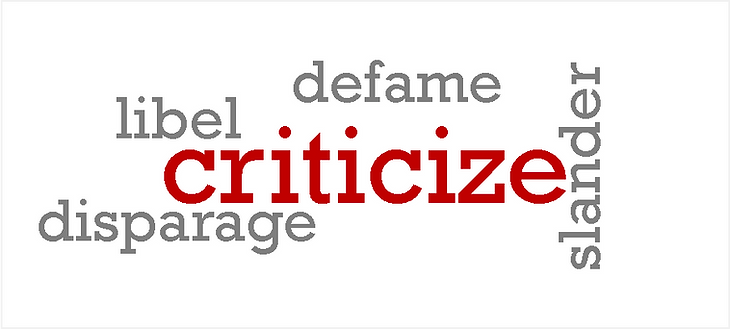Check Out My No-Criticizing Provision

No-disparaging provisions are found in employment agreements, separation agreements, settlement agreements, even end-user license agreements. But there’s a problem with no-disparaging provisions.
Below is part of the Black’s Law Dictionary definition of disparagement. Compare definition 1 (colloquial use) with definition 3 (use as a torts term of art).
Disparagement (di-spar-ij-mənt) n. (16c) 1. A derogatory comparison of one thing with another <the disparagement consisted in comparing the acknowledged liar to a murderer>. 2. The act or an instance of unfairly castigating or detracting from the reputation of someone or something <when she told the press the details of her husband’s philandering, her statements amounted to disparagement>. • Although many disparagements are untruthful or otherwise unfair, falsity is not a requirement. Any statement cast in a negative light may amount to a disparagement in the general sense. 3. Torts. A false and injurious statement that discredits or detracts from the reputation of another’s character, property, product, or business. • To recover in tort for disparagement, the plaintiff must prove that the statement caused a third party to take some action resulting in specific pecuniary loss to the plaintiff. — Also termed injurious falsehood. — More narrowly termed slander of title; trade libel; slander of goods. See TRADE DISPARAGEMENT. Cf. trade defamation under DEFAMATION.
Notice the difference? The former mentions nothing about a statement having to be false to be disparaging. So what we have here is lexical ambiguity—someone might attribute to the word its colloquial meaning without realizing that a court would require that an utterance be false for it to be disparaging. It’s a big enough problem that I don’t feel I need to invoke caselaw to support my not being comfortable with using disparage in a contract.
That prompted me to come up with my own version of a no-disparaging provision:
The Employee shall not say to anyone, in writing or orally, anything critical of the Company, its business, or any of its then-current shareholders, officers, employees, and customers. This section X does not prevent the Employee from exercising rights that by law the Employee cannot waive by contract or from disclosing information to the extent required to comply with the law.
By way of comparison with my first sentence, here’s an alternative, one that resembles a version I saw offered as a model:
The Employee covenants and agrees that the Employee shall not at any time make, communicate, or publish to any person or entity or in any public forum any disparaging remarks, comments, or statements concerning Acme or its businesses, or any of its employees, officers, or directors and its existing and prospective customers.
My version has the benefit of being short and sweet (28 words versus other’s 52 words):
- Using “say … , in writing or orally, anything” is simpler than “make, communicate, or publish … remarks, comments, or statements”.
- Saying “to anyone” is simpler than “to any person or entity”. I could have said shall not criticize to anyone, but I think that’s a little awkward.
Some additional thoughts about the other version:
- Saying “The Employee agrees and covenants that” is flagrant throat-clearing.
- Saying “at any time” is redundant, as a provision applies at any time unless you say otherwise.
- Saying “in any public forum” is a mistake. They were aiming for the concept of publication, which is very different, as well as confusing.
- How does one identify “prospective customers”? With a crystal ball?
In theory, if the employee (or whoever it is) says to their significant other that the company’s logo is the wrong shade of green, arguably the employee would have breached my version. That might seem harsh, but it’s not a concern: if the company can’t show damages, it can’t bring a claim. And anyway, any provision of this sort, however it’s articulated, raises an issue of degree.
What about not requiring that what’s said be false? Adding falsity would make it a lot harder to show breach: it’s simpler just to require whoever it is not to say anything bad. And bear in mind that this sort of provision occurs in a contract where whoever is meant not to criticize is getting something, presumably at a parting of ways. If they don’t like the no-criticizing standard, they don’t have to do the deal.
Furthermore, the notion of requiring falsity raises a broader question: why make it a contract duty for someone not to do something that would constitute a tort? If it constitutes a tort, you would have a cause of action outside the contract! Of course, it would also constitute breach, and that could give rise to a separate claim, and it might allow you to terminate. But that seems overly subtle. That’s why I wouldn’t build a contract provision around the concepts of defamation, slander, or libel either.
So I say go big, with a don’t-say-anything-critical standard, or don’t bother.
Ken Adams is president of Adams Contracts Consulting LLC, author of A Manual of Style for Contract Drafting, and an advisor to LegalSifter.
